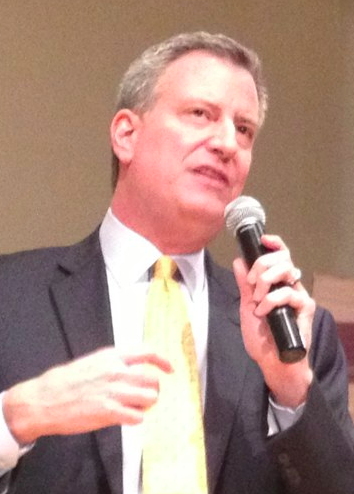On WNYC this morning, Brian Lehrer posed the best transportation question of the 2013 mayoral campaign, asking Bill de Blasio, "Have you thought about transportation as one of your tools to fight inequality?"
Here's what the mayoral frontrunner said:
Transportation determines opportunity, livability, business climate. For many people, the absence of affordable transportation, in outer-borough locations especially, constrains their opportunities.
An encouraging response, but left unsaid by the candidate is that the means of "affordable transportation" are trains, buses, biking, and walking. Most New Yorkers don't have cars, and many households simply can't afford the thousands of dollars in annual costs that come attached to car ownership. De Blasio's policy platform does include ambitious goals to speed up bus service, but on the air he didn't specifically mention transit as a tool to reduce inequality.
Lehrer moved on to Tuesday's mayoral debate, saying he was surprised to hear de Blasio self-identify as a motorist when responding to a question about pedestrian plazas. When he asked if de Blasio thought Bloomberg’s policies were "too anti-car," the candidate responded:
No, I would not say that. A lot of what the mayor’s done is right in this area. Sometimes I think he did it in a way that was less consultative with communities than it could have been.
The core of it I agree with fully. We have to focus on pedestrian safety, we have to focus on bicycle safety. The "Vision Zero" approach which I subscribe to, literally the goal is to have zero fatalities amongst pedestrians and bicyclists. And we have a lot of the tools we need to fundamentally change our approach to safety.I do believe in the bike lanes we have and in expanding them further. I do believe in the traffic calming measures. Pedestrians plazas are part of that.
But on the Times Square and Herald Square plazas specifically, de Blasio was less clear:
I simply said that in my experience, which includes my experience as a as a motorist, we need to look again and see if those are configured as well as they could be. We may find there are some improvements we can make. I am concerned as always about impact on surrounding businesses and job creation.
Lehrer pressed de Blasio on his claim that there needs to be more study of the Midtown plazas. “From what I’ve read, traffic and pollution are down, commercial rents are up and business satisfaction in both places is way up,” Lehrer said. “Is that not your understanding that that’s kind of settled as far as those two locations are concerned?”
Here's how de Blasio tried to straddle his various statements on the issue, saying he's heard "concerns" but without specifying who complained or what they said:
I simply want to give it a look given some of the concerns I have heard from people in the surrounding areas. I don’t think every specific way the Bloomberg administration handled different policies is sacred, by definition.
Obviously on pedestrian safety, on bicycle safety, on bike lanes, on Citi Bike the point is we ought to keep looking at specifics and in certain specific instances we may find there are tweaks we want to make or improvements we want to make. That’s what a mayor should be doing, is looking to make sure the implementation is going the way its supposed to and making changes where they find problems.






